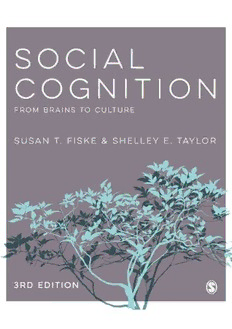
Social Cognition: From Brains to Culture PDF
Preview Social Cognition: From Brains to Culture
Social Cognition 2 3 Social Cognition From Brains to Culture 3RD Edition Susan T. Fiske & Shelley E. Taylor 4 SAGE Publications Ltd 1 Oliver’s Yard 55 City Road London EC1Y 1SP SAGE Publications Inc. 2455 Teller Road Thousand Oaks, California 91320 SAGE Publications India Pvt Ltd B 1/I 1 Mohan Cooperative Industrial Area Mathura Road New Delhi 110 044 SAGE Publications Asia-Pacific Pte Ltd 3 Church Street #10-04 Samsung Hub Singapore 049483 © Susan T. Fiske and Shelley E. Taylor 2017 Second edition published 2013 5 Third edition published 2017 Apart from any fair dealing for the purposes of research or private study, or criticism or review, as permitted under the Copyright, Designs and Patents Act, 1988, this publication may be reproduced, stored or transmitted in any form, or by any means, only with the prior permission in writing of the publishers, or in the case of reprographic reproduction, in accordance with the terms of licences issued by the Copyright Licensing Agency. Enquiries concerning reproduction outside those terms should be sent to the publishers. Library of Congress Control Number: 2016944620 British Library Cataloguing in Publication data A catalogue record for this book is available from the British Library ISBN 978-1-4739-6929-2 ISBN 978-1-4739-6930-8 (pbk) Editor: Luke Block Editorial assistant: Lucy Dang Production editor: Imogen Roome Copyeditor: Sarah Bury Proofreader: Jess White Indexer: Silvia Benvenuto Marketing manager: Lucia Sweet Cover design: Wendy Scott Typeset by: C&M Digitals (P) Ltd, Chennai, India Printed in the UK 6 To Doug, Lydia, Vanessa, Geoff, Meredith, Sam, and Max and To Mervyn, Charlie, Sara, Karl, Sebastian, and Nathaniel 7 Contents Acknowledgements Preface Companion Website 1 Introduction PART ONE: Basic Concepts in Social Cognition 2 Dual Modes in Social Cognition 3 Attention and Encoding 4 Representation in Memory PART TWO: Understanding Individual Selves and Others 5 Self in Social Cognition 6 Attribution Processes 7 Heuristics and Shortcuts: Efficiency in Inference and Decision Making 8 Accuracy and Efficiency in Social Inference PART THREE: Making Sense of Society 9 Cognitive Structures of Attitudes 10 Cognitive Processing of Attitudes 11 Stereotyping: Cognition and Bias 12 Prejudice: Interplay of Cognitive and Affective Biases PART FOUR: Beyond Cognition: Affect and Behavior 13 From Social Cognition to Affect 14 From Affect to Social Cognition 15 Behavior and Cognition Glossary References Index 8 Detailed Contents Acknowledgements Preface Companion Website 1 Introduction Approaches to Studying the Social Thinker The Ebb and Flow of Cognition in Psychology What is Social Cognition? People are Not Things Brains Matter Cultures Matter PART ONE: Basic Concepts in Social Cognition 2 Dual Modes in Social Cognition Automatic Processes Make Social Thinking Efficient Controlled Processes Make Social Thinking Flexible Motivations Influence which Modes Operate Models Describe the How and When of Automatic and Controlled Processes 3 Attention and Encoding Faces: The Focus of Social Attention Salience: A Property of Stimuli in Context Vividness: An Inherent Property of Stimuli Accessibility: A Property of Categories in Our Heads Direct Perception: Not Just in Our Heads 4 Representation in Memory Associative Networks: Organizing Memory Procedural and Declarative Memory: What Memory Does Parallel versus Serial Processing: Coordinating Memory Processes Embodied Memory: Including Physical Representation Social Memory Structures: Why Social Memory Matters PART TWO: Understanding Individual Selves and Others 5 Self in Social Cognition The Self is a Mental Representation The Self Provides Information to Guide Self-Regulation The Self has Varied Motivations for Self-Regulation The Self Serves as a Reference Point 9 6 Attribution Processes Attributions Aim to Explain Social Experiences Early Attribution Theories Emphasized Rational Analysis Several Cognitive Processes Underlie Attribution Attributions are Often Biased 7 Heuristics and Shortcuts: Efficiency in Inference and Decision Making Heuristics are Decision Shortcuts that Compromise between Efficiency and Accuracy Beyond Heuristics: Decision Shortcuts Often Create Errors and Biases Judgments over Time Add Biases 8 Accuracy and Efficiency in Social Inference Why is Rationality Assumed? Social Inferences Sometimes Produce Wrong Answers: When? Errors and Biases as Consequential: Improving the Inference Process Errors and Biases as Incidental: Perhaps They Don’t Matter Are Rapid Judgments Sometimes Better than Thoughtfully Considered Ones? Neuroeconomics: Back to the Future PART THREE: Making Sense of Society 9 Cognitive Structures of Attitudes Newer Approaches Build on Early Insights Cognitive Representation Foreshadowed in Two Consistency Theories Representations Can Be Discrete versus Distributed People Have Lay Theories about Attitude Change Functional Dimensions of Attitudes 10 Cognitive Processing of Attitudes Heuristic versus Systematic Model Anticipates Dual- Process Approaches Peripheral versus Central Routes to Persuasion: Elaboration Likelihood Model Motivation and Opportunity Determine Attitude Processes: The MODE Model Implicit Associations Focus on Relatively Automatic Processes Embodied Attitudes Bypass Cognition? 10
